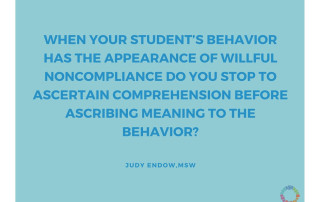Autism, Social Greetings and Rhetorical Questions
by Judy Endow Autism and Rhetorical Questions Autistic people may not automatically know how to respond to rhetorical social questions such as “How are you?” or automatically reciprocate in social pleasantries such as “good morning.” This is not because they are rude, obnoxious, don’t care, or any of the other assumed reasons people attribute to this behavior. Instead, it is because all social information is not automatically picked up and used by a person with an autistic brain. The autistic brain simply works differently. Even so, autistic people can learn those things their particular brain hasn’t allowed them to automatically
Autistic Visual Thinking Impacts Comprehension
by Judy Endow I think in colors. My thinking colors have sound and movement. When I hear spoken words my neurology automatically goes for the match – a match for the words I hear to a familiar concrete picture of something in the world outside my skin or to an internal picture I have stored in my memory. . When I was a girl I heard the saying, “I got the world by the tail.” Immediately, the matching pictures of my experience of the world popped up for me to see. I found the best match and promptly assigned


